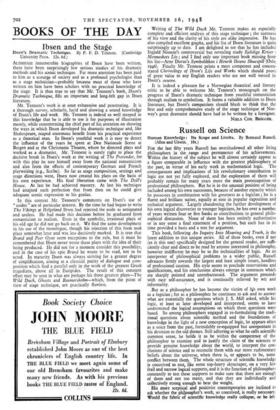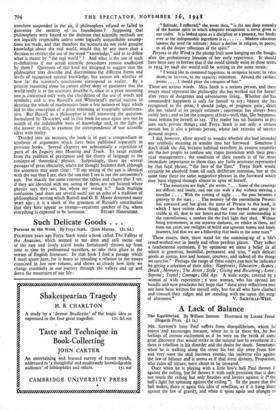Russell on Science
Human Knowledge : Its Scope and Limits. By Bertrand Russell. (Allen and Unwin.. 18s.) Human Knowledge : Its Scope and Limits. By Bertrand Russell. (Allen and Unwin.. 18s.)
FOR the last fifty years Russell has overshadowed all other living philosophers in the range and permanence of his achievements. Within the history of the subject he will almost certainly appear as a figure comparable in influence with the greatest philosophers of the past, in virtue of his early work in mathematical logic. The consequences and implications of his revolutionary contribution to logic are not yet fully explored, and the exploration of them will probably remain for many years more the main preoccupation of professional philosophers. But he is in the unusual position of being included among his own successors, because of another capacity which he possesses in combination with his greatness as a logician ; he is a fluent and brilliant writer, equally at ease in popular exposition and technical argument. Largely abandoning the further development of his own logical discoveries to younger logicians, he has over a numbet of years written four or five books as contributions to general philo- sophical discussion. None of them has been entirely authoritative or in any sense a final statement of a position, but each has in its time provided a basis and a text for argument.
This book, following An Inquiry Into Meaning and Truth, is the latest addition to this unique series. All of these books, even if not (as is this one) specifically designed for the general reader, are suffi- ciently clear and direct to be read by anyone interested in philosophy, however indifferent he may be to the technicalities of logic. As an interpreter of philosophical problems to a wider public, Russell advances firmly towards the largest and least simple issues, heedless of professional caution. His style seems to preclude reservations and qualifications, and his conclusions always emerge in sentences which are sharply pointed and unembarrassed. The argument proceeds with easy self-assurance, and is continually relieved by wit and informality.
But as a philosopher he has become the victim of 11,is own work as a logician ; for as a philosopher he continues to ask and to answer what are essentially the questions which J. S. Mill asked, while his logic, at least as later developed and interpreted, seems to have undermined the logical assumptions on which these questions were based. So among philosophers engaged in re-formulating the tradi- tional questions about scientific method and the foundations of knowledge in the light of a new conception of logic, he appears often as a voice from the past, formidably re-equipped but unrepentant in his devotion to the old themes. Still adhering to what he calls scientific common sense, he holds it to be within the competence of the philosopher to examine and to justify the claim of the sciences to provide genuine knowledge about the world, to interpret the con- clusions of science and to reconcile them with our more rudimentary beliefs about the universe, when there is, or appears to be, some conflict between them. The whole structure of scientific knowledge is conceived to rest, like some top-heavy skyscraper, on a very few frail and narrow logical supports, and it is the function of philosophers constantly to test these supports to make sure that there are enough of them and not too many, and that they are individually and collectively strong enough to bear the weight.
His more sceptical and positivist contemporaries are inclined to ask whether the philosopher's work, so conceiv.ed, is really necessary. Would the fabric of scientific knowledge really collapse, or be left somehow suspended in the air, if philosophers refused or failed to
guarantee the security of its foundations ? Supposing that philosophers were forced to the decision that scientific methods are not logically respectable unless some logically unjustifiable assump- tions are made, and that therefore the sciences do not yield genuine knowledge about the real world, would this be any more than a decision to restrict the use of the word "knowledge," and to re-define what is meant by "the real world " ? And what is the use of such re-definitions if our actual scientific procedures remain unaffected by them ? Questions of this kind are designed to suggest that the philosopher may describe and discriminate the different forms and levels of recognised natural knowledge, but cannot ask whether or how far the scientist's conclusions correspond to reality. By a priority reasoning alone he cannot either deny or guarantee that the world really is as the scientists describe it, since in a prior reasoning one is concerned only with the elucidation of the use of words and symbols ; and it was Russell's and Whitehead's partial success in deriving the whole of mathematics from a few notions of logic which Zed to this conception of a prior reasoning as essentially uninforma- tive. But Russell as a philosopher is still answering the questions formulated by Descartes, and in this book he once again sets out in search of the indubitable basis of knowledge and, in the light of the answer to this, to examine the correspondence of our scientific ideas with reality.
Divided into six sections, the book is in part a compendium or synthesis of arguments which have been published separately in previous books. Several chapters are substantially a repetition of parts of An Inquiry into Meaning and Truth. Its range extends from the problem of perception and the theory of language to the concepts of theoretical physics. Surprisingly, there are several passages of great obscurity, where the thought becomes dark although the sentences may seem clear : "If my seeing of the sun is identical with the sun that I see, then the sun that I see is not the astronomer's sun. For exactly the same reasons the tables and chairs that I see, if they are identical with my seeing of them, are not located where physics says they are, but where my seeing is." Such multiple confusions (and there are several such) are an echo of a tradition of philosophical writing which Russell and G. E. Moore destroyed many years ago ; it is a mark of the greatness of Russell's contribution that they here appear so strange—recurrent patches of fog where
everything is expected to be luminous. STUART HAMPSHIRE.





































 Previous page
Previous page